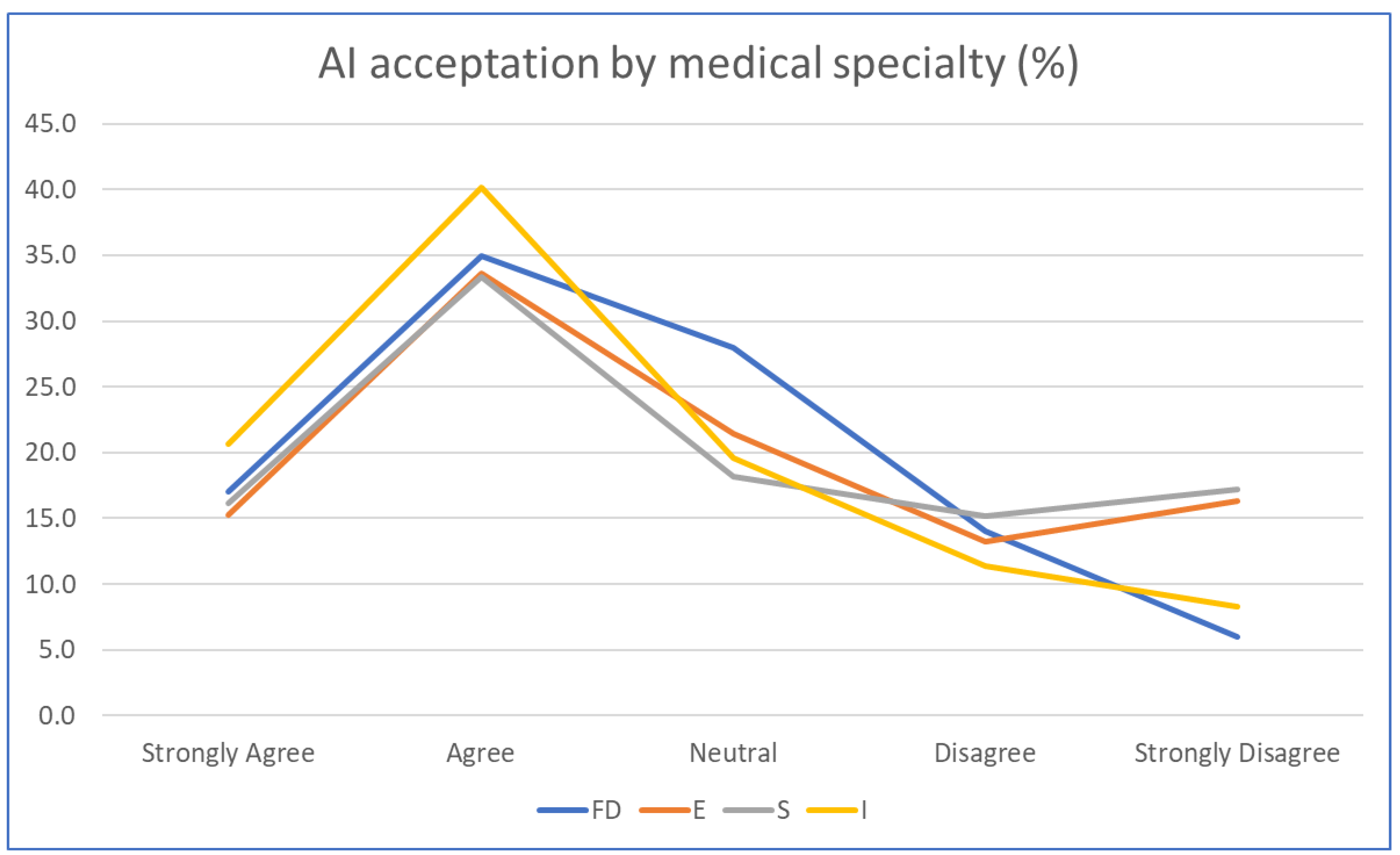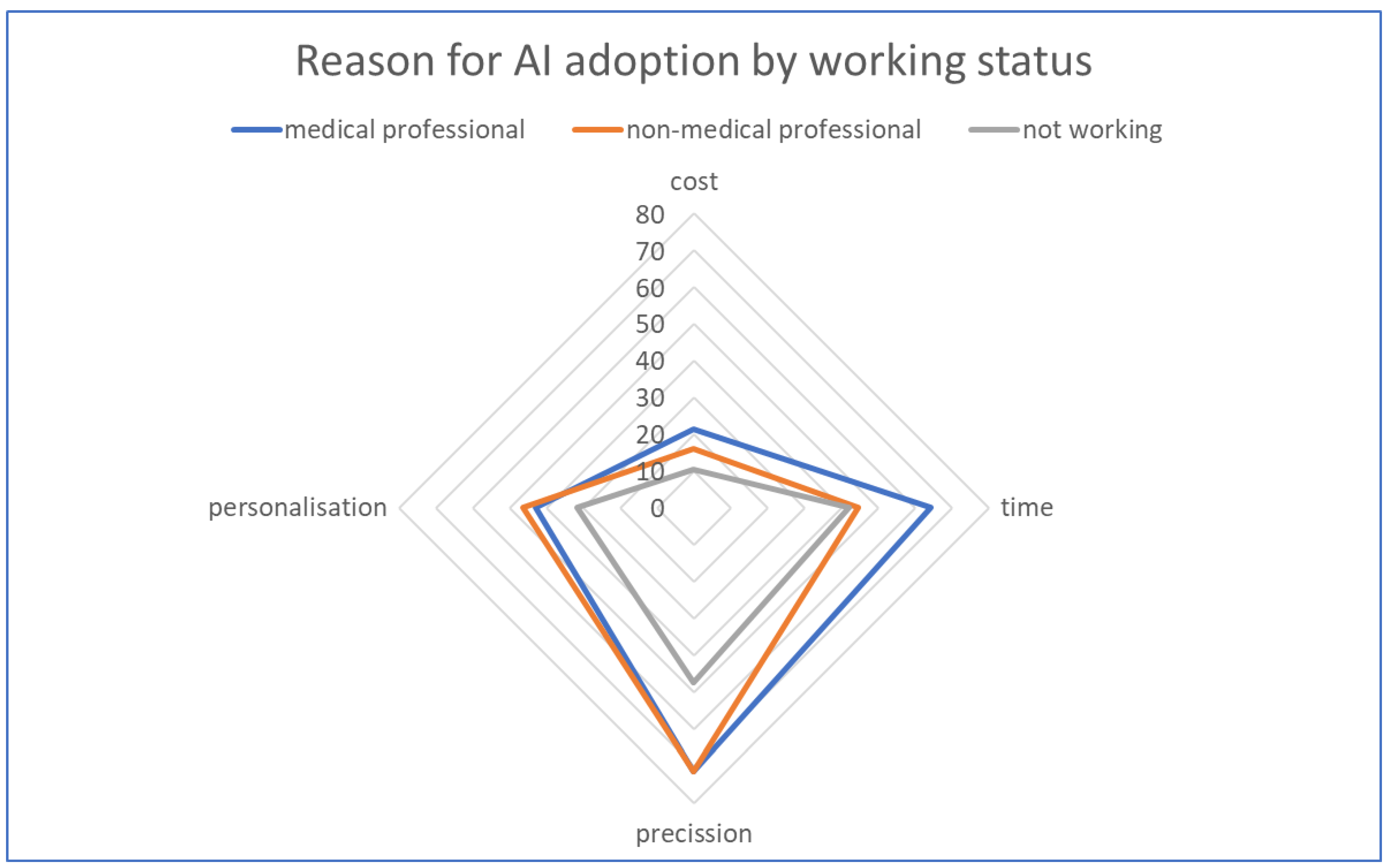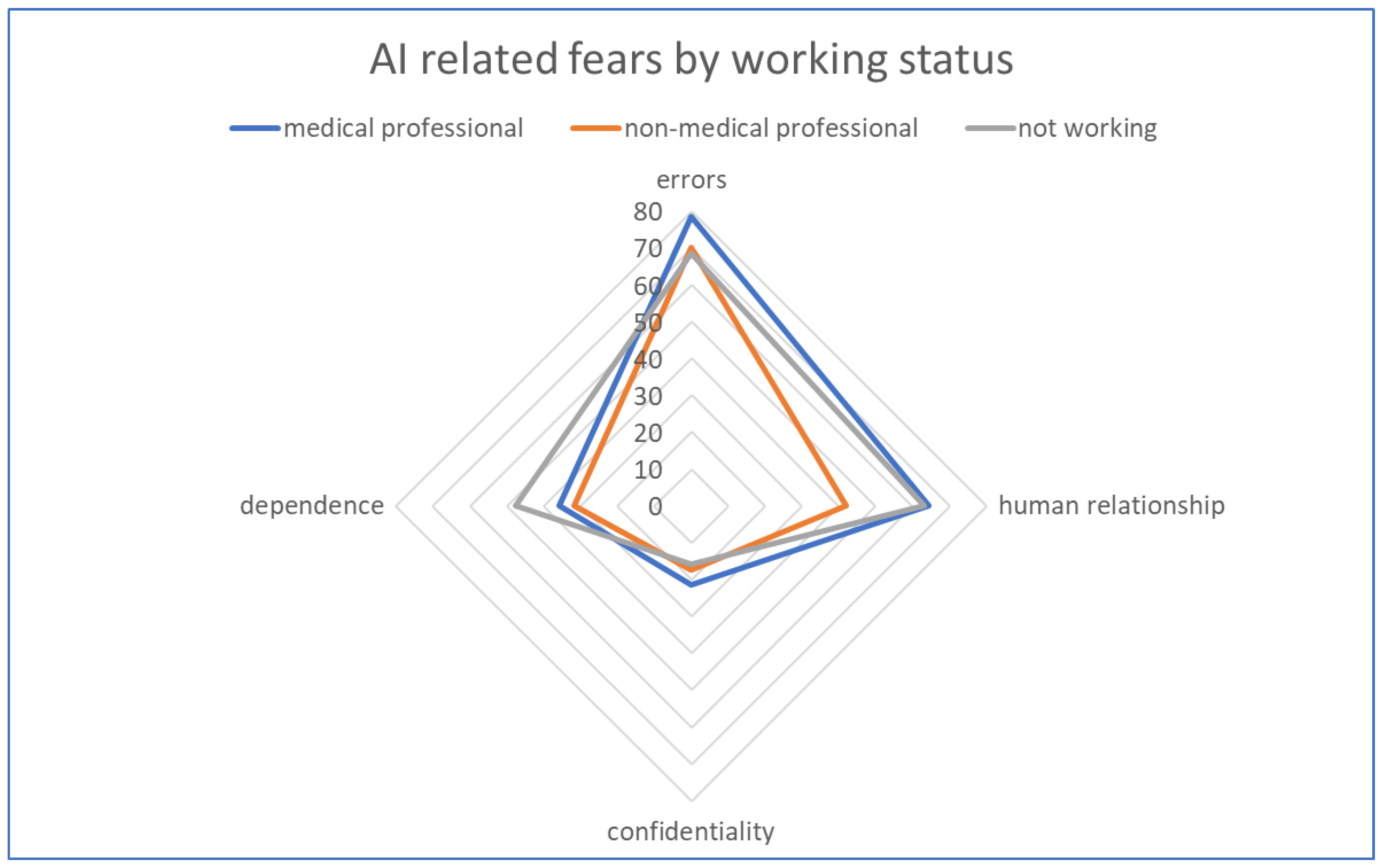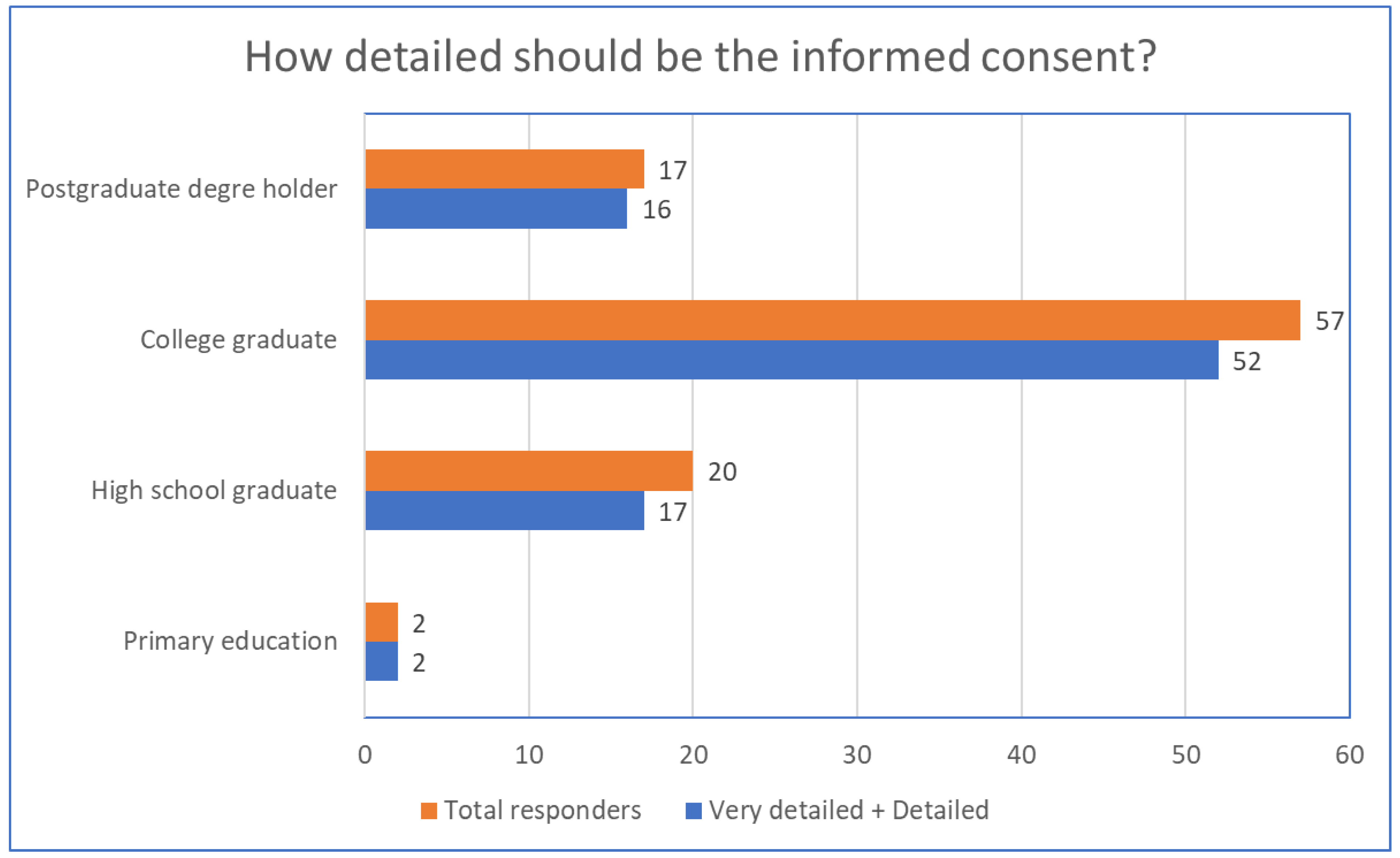Integrating Artificial Intelligence in Pediatric Healthcare: Parental Perceptions and Ethical Implications
Abstract
1. Introduction
2. Materials and Methods
3. Results
4. Discussion
5. Conclusions
Supplementary Materials
Author Contributions
Funding
Institutional Review Board Statement
Informed Consent Statement
Data Availability Statement
Conflicts of Interest
References
- Russell, S.J.; Norvig, P. Artificial Intelligence: A Modern Approach; Pearson Education, Inc.: Upper Saddle River, NJ, USA, 2010. [Google Scholar]
- Marcus, G.; Davis, E. Rebooting AI: Building Artificial Intelligence We Can Trust; Knopf Doubleday Publishing Group: New York, NY, USA, 2019; Available online: https://books.google.ro/books?id=O8muDwAAQBAJ (accessed on 27 December 2023).
- Google Trends. Available online: https://trends.google.com/trends/explore?date=today%205-y&q=artificial%20intelligence&hl=ro (accessed on 27 December 2023).
- Rahman, M.d.A.; Victoros, E.; Ernest, J.; Davis, R.; Shanjana, Y.; Islam, M.d.R. Impact of Artificial Intelligence (AI) Technology in Healthcare Sector: A Critical Evaluation of Both Sides of the Coin. Clin. Pathol. 2024, 17, 2632010X241226887. [Google Scholar] [CrossRef] [PubMed]
- Brauner, P.; Hick, A.; Philipsen, R.; Ziefle, M. What does the public think about artificial intelligence?—A criticality map to understand bias in the public perception of AI. Front. Comput. Sci. 2023, 5, 1113903. Available online: https://www.frontiersin.org/articles/10.3389/fcomp.2023.1113903 (accessed on 27 December 2023). [CrossRef]
- Lambert, S.I.; Madi, M.; Sopka, S.; Lenes, A.; Stange, H.; Buszello, C.P.; Stephan, A. An integrative review on the acceptance of artificial intelligence among healthcare professionals in hospitals. NPJ Digit. Med. 2023, 6, 111. [Google Scholar] [CrossRef] [PubMed]
- Stai, B.; Heller, N.; McSweeney, S.; Rickman, J.; Blake, P.; Vasdev, R.; Edgerton, Z.; Tejpaul, R.; Peterson, M.; Rosenberg, J.; et al. Public Perceptions of Artificial Intelligence and Robotics in Medicine. J. Endourol. 2020, 34, 1041–1048. [Google Scholar] [CrossRef] [PubMed]
- Sisk, B.A.; Antes, A.L.; Burrous, S.; DuBois, J.M. Parental Attitudes toward Artificial Intelligence-Driven Precision Medicine Technologies in Pediatric Healthcare. Children 2020, 7, 145. [Google Scholar] [CrossRef] [PubMed]
- Haley, L.C.; Boyd, A.K.; Hebballi, N.B.; Reynolds, E.W.; Smith, K.G.; Scully, P.T.; Nguyen, T.L.; Bernstam, E.V.; Li, L.T. Attitudes on Artificial Intelligence use in Pediatric Care From Parents of Hospitalized Children. J. Surg. Res. 2024, 295, 158–167. [Google Scholar] [CrossRef] [PubMed]
- Shehab, M.; Abualigah, L.; Shambour, Q.; Abu-Hashem, M.A.; Shambour, M.K.Y.; Alsalibi, A.I.; Gandomi, A.H. Machine learning in medical applications: A review of state-of-the-art methods. Comput. Biol. Med. 2022, 145, 105458. [Google Scholar] [CrossRef]
- Elad, B. Enterprise Apps Today. AI in Healthcare Statistics 2023 by Market Share, Users and Companies. 2023. Available online: https://www.enterpriseappstoday.com/stats/ai-in-healthcare-statistics.html (accessed on 27 December 2023).
- Global Portable Medical Devices Industry Forecasted to Surge at 10.7% CAGR, Expected to Attain US$163.84 Billion by 2033|FMI. FMIBlog. 2023. Available online: https://www.fmiblog.com/2023/12/29/global-portable-medical-devices-industry-forecasted-to-surge-at-10-7-cagr-expected-to-attain-us-163-84-billion-by-2033-fmi/ (accessed on 30 December 2023).
- Yousefli, Z.; Nasiri, F.; Moselhi, O. Maintenance workflow management in hospitals: An automated multi-agent facility management system. J. Build. Eng. 2020, 32, 101431. [Google Scholar] [CrossRef]
- Vrontis, D.; Christofi, M.; Pereira, V.; Tarba, S.; Makrides, A.; Trichina, E. Artificial intelligence, robotics, advanced technologies and human resource management: A systematic review. Int. J. Hum. Resour. Manag. 2022, 33, 1237–1266. [Google Scholar] [CrossRef]
- Muehlematter, U.J.; Daniore, P.; Vokinger, K.N. Approval of artificial intelligence and machine learning-based medical devices in the USA and Europe (2015–2020): A comparative analysis. Lancet Digit. Health 2021, 3, e195–e203. [Google Scholar] [CrossRef]
- Gutierrez, G. Artificial Intelligence in the Intensive Care Unit. Crit. Care 2020, 24, 101. [Google Scholar] [CrossRef]
- Aggarwal, R.; Sounderajah, V.; Martin, G.; Ting, D.S.W.; Karthikesalingam, A.; King, D.; Ashrafian, H.; Darzi, A. Diagnostic accuracy of deep learning in medical imaging: A systematic review and meta-analysis. NPJ Digit. Med. 2021, 4, 65. [Google Scholar] [CrossRef]
- Johnson, K.B.; Wei, W.; Weeraratne, D.; Frisse, M.E.; Misulis, K.; Rhee, K.; Zhao, J.; Snowdon, J.L. Precision Medicine, AI, and the Future of Personalized Health Care. Clin. Transl. Sci. 2021, 14, 86–93. [Google Scholar] [CrossRef]
- Jiménez-Luna, J.; Grisoni, F.; Weskamp, N.; Schneider, G. Artificial intelligence in drug discovery: Recent advances and future perspectives. Expert Opin. Drug Discov. 2021, 16, 949–959. [Google Scholar] [CrossRef]
- Lancet, T. AI in medicine: Creating a safe and equitable future. Lancet 2023, 402, 503. [Google Scholar] [CrossRef] [PubMed]
- Nashwan, A.J.; Abujaber, A.A.; Nashwan, A.J.; AbuJaber, A. Nursing in the Artificial Intelligence (AI) Era: Optimizing Staffing for Tomorrow. Cureus 2023, 15, e47275. Available online: https://www.cureus.com/articles/198118-nursing-in-the-artificial-intelligence-ai-era-optimizing-staffing-for-tomorrow (accessed on 30 December 2023). [CrossRef]
- Liang, H.; Tsui, B.Y.; Ni, H.; Valentim, C.C.S.; Baxter, S.L.; Liu, G.; Cai, W.; Kermany, D.S.; Sun, X.; Chen, J.; et al. Evaluation and accurate diagnoses of pediatric diseases using artificial intelligence. Nat. Med. 2019, 25, 433–438. [Google Scholar] [CrossRef] [PubMed]
- Annapragada, A.V.; Donaruma-Kwoh, M.M.; Annapragada, A.V.; Starosolski, Z.A. A natural language processing and deep learning approach to identify child abuse from pediatric electronic medical records. PLoS ONE 2021, 16, e0247404. [Google Scholar] [CrossRef]
- Amin, D.; Garzόn-Orjuela, N.; Garcia Pereira, A.; Parveen, S.; Vornhagen, H.; Vellinga, A. Artificial Intelligence to Improve Antibiotic Prescribing: A Systematic Review. Antibiotics 2023, 12, 1293. [Google Scholar] [CrossRef]
- Lee, S.; Shin, J.; Kim, H.S.; Lee, M.J.; Yoon, J.M.; Lee, S.; Kim, Y.; Kim, J.-Y.; Lee, S. Hybrid Method Incorporating a Rule-Based Approach and Deep Learning for Prescription Error Prediction. Drug Saf. 2022, 45, 27–35. [Google Scholar] [CrossRef] [PubMed]
- Oonsivilai, M.; Mo, Y.; Luangasanatip, N.; Lubell, Y.; Miliya, T.; Tan, P.; Loeuk, L.; Turner, P.; Cooper, B.S. Using machine learning to guide targeted and locally-tailored empiric antibiotic prescribing in a children’s hospital in Cambodia. Wellcome Open Res. 2018, 3, 131. [Google Scholar] [CrossRef]
- Lam, A.B.; Moore, V.; Nipp, R.D. Care Delivery Interventions for Individuals with Cancer: A Literature Review and Focus on Gastrointestinal Malignancies. Healthcare 2024, 12, 30. [Google Scholar] [CrossRef] [PubMed]
- Eltawil, F.A.; Atalla, M.; Boulos, E.; Amirabadi, A.; Tyrrell, P.N. Analyzing Barriers and Enablers for the Acceptance of Artificial Intelligence Innovations into Radiology Practice: A Scoping Review. Tomography 2023, 9, 1443–1455. [Google Scholar] [CrossRef] [PubMed]
- You, Y.; Lai, X.; Pan, Y.; Zheng, H.; Vera, J.; Liu, S.; Deng, S.; Zhang, L. Artificial intelligence in cancer target identification and drug discovery. Signal Transduct. Target. Ther. 2022, 7, 156. [Google Scholar] [CrossRef] [PubMed]
- Huang, S.; Yang, J.; Shen, N.; Xu, Q.; Zhao, Q. Artificial intelligence in lung cancer diagnosis and prognosis: Current application and future perspective. Semin. Cancer Biol. 2023, 89, 30–37. [Google Scholar] [CrossRef] [PubMed]
- Coghlan, S.; Gyngell, C.; Vears, D.F. Ethics of artificial intelligence in prenatal and pediatric genomic medicine. J. Community Genet. 2023, 2023. 15, 13–24. [Google Scholar] [CrossRef]
- Kelly, S.; Kaye, S.A.; Oviedo-Trespalacios, O. What factors contribute to the acceptance of artificial intelligence? A systematic review. Telemat. Inform. 2023, 77, 101925. [Google Scholar] [CrossRef]
- Fritsch, S.J.; Blankenheim, A.; Wahl, A.; Hetfeld, P.; Maassen, O.; Deffge, S.; Kunze, J.; Rossaint, R.; Riedel, M.; Marx, G.; et al. Attitudes and perception of artificial intelligence in healthcare: A cross-sectional survey among patients. Digit. Health 2022, 8, 20552076221116772. [Google Scholar] [CrossRef] [PubMed]
- Manole, M.; Duma, O.; Gheorma, A.; Manole, A.; Pavaleanu, I.; Velenciuc, N.; Chelaru, L.; Duceac, L.-D. Self-medication–A public health problem in romania nowadays. The first quests. Med.-Surg. J. 2017, 121, 608–615. [Google Scholar]
- Tarciuc, P.; Stanescu, A.M.A.; Diaconu, C.C.; Paduraru, L.; Duduciuc, A.; Diaconescu, S. Patterns and Factors Associated with Self-Medication among the Pediatric Population in Romania. Medicina 2020, 56, 312. [Google Scholar] [CrossRef]
- Barometrul de Sănătate Publică, Noiembrie—Decembrie 2021—Arpim. Available online: https://arpim.ro/barometrul-de-sanatate-publica-noiembrie-decembrie-2021/ (accessed on 30 December 2023).
- Shreck, E.; Gonzalez, J.S.; Cohen, H.W.; Walker, E.A. Risk perception and self-management in urban, diverse adults with type 2 diabetes: The improving diabetes outcomes study. Int. J. Behav. Med. 2014, 21, 88–98. [Google Scholar] [CrossRef] [PubMed]
- Hangaard, S.; Laursen, S.H.; Andersen, J.D.; Kronborg, T.; Vestergaard, P.; Hejlesen, O.; Udsen, F.W. The Effectiveness of Telemedicine Solutions for the Management of Type 2 Diabetes: A Systematic Review, Meta-Analysis, and Meta-Regression. J. Diabetes Sci. Technol. 2023, 17, 794–825. [Google Scholar] [CrossRef] [PubMed]
- Norton, M.I.; Mochon, D.; Ariely, D. The IKEA effect: When labor leads to love. J. Consum. Psychol. 2012, 22, 453–460. [Google Scholar] [CrossRef]
- Aggarwal, A.; Tam, C.C.; Wu, D.; Li, X.; Qiao, S. Artificial Intelligence–Based Chatbots for Promoting Health Behavioral Changes: Systematic Review. J. Med. Internet Res. 2023, 25, e40789. [Google Scholar] [CrossRef]
- Doraiswamy, S.; Abraham, A.; Mamtani, R.; Cheema, S. Use of Telehealth during the COVID-19 Pandemic: Scoping Review. J. Med. Internet Res. 2020, 22, e24087. [Google Scholar] [CrossRef]
- Romanian Govern: HOTARARE 1133 14/09/2022. Available online: https://legislatie.just.ro/Public/DetaliiDocument/259367 (accessed on 30 December 2023).




| Age of the relative (years)—Mean (SD) | 37.5 (8.05) | N = 98 |
| Age of the child (years)—Mean (SD) | 6.63 (3.88) | N = 98 |
| Gender of the child—No. of valid answers | N = 100 | |
| Male | 33% | |
| Female | 67% | |
| Education level of the respondent—No. of valid answers | N = 99 | |
| Primary education | 2% | |
| High school graduate | 22.2% | |
| College graduate | 57.6% | |
| Postgraduate degree holder | 18.2% | |
| Employment status of the respondent—No. of valid answers | N = 99 | |
| Student | 0% | |
| Medical professional | 14.2% | |
| Non-medical professional | 59.6% | |
| Retired | 3% | |
| Other | 23.2% |
| Area | Number of Questions |
|---|---|
| Demographic data | 5 |
| Familiarization with the term AI | 1 |
| Knowledge of AI utilization in medicine | 3 |
| Use of AI in different medical fields | 4 |
| Acceptance of AI in the context of childcare | 2 |
| Fears regarding the use of AI in medicine | 2 |
| The need for parent information and obtaining informed consent prior to the use of AI | 4 |
| Ethics of AI usage | 2 |
Disclaimer/Publisher’s Note: The statements, opinions and data contained in all publications are solely those of the individual author(s) and contributor(s) and not of MDPI and/or the editor(s). MDPI and/or the editor(s) disclaim responsibility for any injury to people or property resulting from any ideas, methods, instructions or products referred to in the content. |
© 2024 by the authors. Licensee MDPI, Basel, Switzerland. This article is an open access article distributed under the terms and conditions of the Creative Commons Attribution (CC BY) license (https://creativecommons.org/licenses/by/4.0/).
Share and Cite
Berghea, E.C.; Ionescu, M.D.; Gheorghiu, R.M.; Tincu, I.F.; Cobilinschi, C.O.; Craiu, M.; Bălgrădean, M.; Berghea, F. Integrating Artificial Intelligence in Pediatric Healthcare: Parental Perceptions and Ethical Implications. Children 2024, 11, 240. https://doi.org/10.3390/children11020240
Berghea EC, Ionescu MD, Gheorghiu RM, Tincu IF, Cobilinschi CO, Craiu M, Bălgrădean M, Berghea F. Integrating Artificial Intelligence in Pediatric Healthcare: Parental Perceptions and Ethical Implications. Children. 2024; 11(2):240. https://doi.org/10.3390/children11020240
Chicago/Turabian StyleBerghea, Elena Camelia, Marcela Daniela Ionescu, Radu Marian Gheorghiu, Iulia Florentina Tincu, Claudia Oana Cobilinschi, Mihai Craiu, Mihaela Bălgrădean, and Florian Berghea. 2024. "Integrating Artificial Intelligence in Pediatric Healthcare: Parental Perceptions and Ethical Implications" Children 11, no. 2: 240. https://doi.org/10.3390/children11020240
APA StyleBerghea, E. C., Ionescu, M. D., Gheorghiu, R. M., Tincu, I. F., Cobilinschi, C. O., Craiu, M., Bălgrădean, M., & Berghea, F. (2024). Integrating Artificial Intelligence in Pediatric Healthcare: Parental Perceptions and Ethical Implications. Children, 11(2), 240. https://doi.org/10.3390/children11020240







